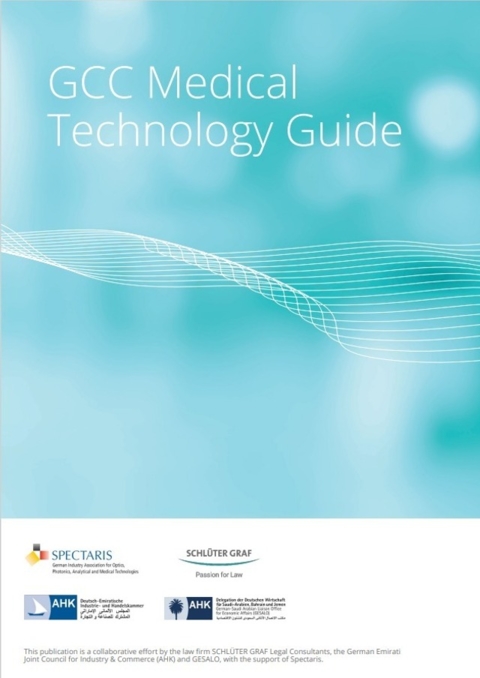
Mrs. Najah Alkutbi
Head of Market Entry - DEinternationalDEinternational
+966 55 703 0376 alkutbi@ahk-arabia.com saudiarabien.ahk.de
The Saudi-Arabian healthcare sector is currently undergoing a transformation. The healthcare sector is expected to grow 10% over the next years. Saudi Arabia is the largest spender of healthcare in Middle East and North Africa. In 2019 the health expenditure per capita was around USD 1,316 or 5.7% of GDP (WHO Global Health Expenditure Database). According to the Ministry of Health (MOH) the sector must overcome numerous challenges.
Health care cost is constantly rising, driven by an ageing population, change in disease pattern and medical innovations. At the same time, budgetary resources are under pressure. The Ministry of Health has launched one of the world’s largest healthcare sector transformation programs to optimize clinical outcomes, cost and responsiveness of the overall system.
To implement the goals of the transformation process, the Kingdom has also released a five year E-Health National Strategy. The plan is an important tool to achieve the goals set in the transformation process and to achieve a comprehensive patient healthcare management system.
The trend in the GCC is shifting from a fee for services to a value-based healthcare model that focuses on enhancing treatment outcomes while lowering costs. Saudi Arabia is spearheading this development in the region with the objective to establish 20 regional Accountable Care Organizations across the Kingdom and the implementation of a comprehensive Population Health Management.
The ambitious transformation of the Saudi Arabian healthcare system offers German companies a wealth of opportunities in the healthcare sector.
From large global players excelling in healthcare equipment and medical technology to innovative niche providers and SMEs seeking partnerships, there are a multitude of opportunities for collaboration. Initiatives such as the privatization of hospitals and the introduction of Accountable Care Organizations underline efforts to provide more efficient and innovative healthcare and offer opportunities for German experts to advise and contribute. In addition, Saudi Arabia is specifically looking for innovations in the healthcare sector.
The Kingdom of Bahrain has one of the oldest healthcare sectors in the Gulf region, dating back to 1902 when American missionaries established the first modern hospital in the region. To advance the established healthcare sector, Bahrain has lately taken steps to introduce greater private sector involvement, which led many foreign healthcare companies to market their services and products in the Kingdom. Bahrain has seen a sharp rise in imports alone in 2019/2020 – especially in regard to medical devices. Bahrain imported medical devices worth more than BD 30 million. The trend is set to grow, given the promised investment by the Bahraini government in the coming years.
Bahrain has a comprehensive regulatory mechanism in place which spans from the pre-entry of the medical product in the country to its post-market surveillance to ensure that the residents of the Kingdom are getting access to the best medical products in line with international standards. In addition, health insurance is regulated compulsory for almost all citizens, residents, and visitors by the 2018 National Health Insurance Law (NHIL).
Bahrain is home to prominent healthcare training institutions, providing solid foundations for further healthcare investment. The Kingdom has a young (with a median of 32,5 years), educated population with the region’s highest private sector engagement. Bahrain’s population offers a highly skilled local and global workforce with one of the best human capital developments in the Middle East and North Africa (MENA) according to the World Bank. Ranked the first in MENA for ICT readiness (information and communications technology) by the World Economic Forum.
Over the past decades, the GGC countries (Bahrain, Kuwait, Oman, Qatar, Saudi Arabia and the United Arab Emirates) have witnessed immense economic growth which has fueled the demand for excellent healthcare services, compelling the GCC governments to allocate a significant amount of their budgets to the healthcare sector.
As a result, the region’s healthcare system has witnessed a substantial boom which in return has created numerous opportunities for foreign healthcare companies to explore the healthcare market in the region.
This publication is a joint effort of the law firm SCHLÜTER GRAF Legal Consultants, the German Emirati Joint Council for Industry & Commerce (AHK) and GESALO, with the support of Spectaris.
Get the full report below:
Head of Market Entry - DEinternationalDEinternational
+966 55 703 0376 alkutbi@ahk-arabia.com saudiarabien.ahk.deHead of German Desk Western ProvinceDEinternational
+966 53 929 0004 basyouni@ahk-arabia.com saudiarabien.ahk.deHead of German Desk in Eastern Province and BahrainDE international
+966 55 930 0150 bakhsh@ahk-arabia.com saudiarabien.ahk.de


